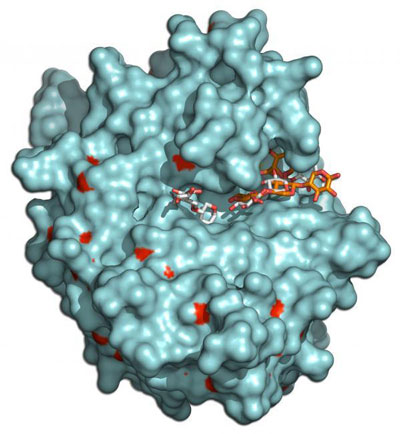| Posted: February 11, 2010 |
Bacterial enzyme with industrial applications characterized |
|
(Nanowerk News) Microbial enzymes are commonly used to reduce the levels of contamination created by industrial processes. In an article published in The Journal of Biological Chemistry, the researchers Óscar Gallardo, F. Javier Pastor and Pilar Diaz from the Microbial Enzymes Group of the Faculty of Biology present their characterization of a xylan-degrading enzyme from the the bacteria Paenibacillus barcinonensis, an isolated microorganism found in the Ebro delta ("Structural Insights into the Specificity of Xyn10B from Paenibacillus barcinonensis and Its Improved Stability by Forced Protein Evolution").
|
 |
| Three-dimensional structure of the Xyn10B enzyme, with a xylan substrate at its active centre
|
|
The industrial sector is increasingly concerned with reducing the energy consumption of key processes, producing less waste and contaminants, and improving the quality of end products through the application of sustainable technologies. One example is the bleaching of wood pulp in paper manufacturing, which has traditionally produced large amounts of toxic residues due to the lignin content of the raw materials. To clean up the procedure, enzymes called xylanases are now used to degrade the xylan that traps the residual lignin responsible for the unwanted dark coloration of the pulp. The use of these enzymes reduces the amount of chlorine required by 20-25%, lowering the volume of organochlorine contaminants generated.
|
|
According to Dr. F. Javier Pastor of the Department of Microbiology, "the enzyme (Xyn10B) we have characterized and protein-engineered for the study is particularly notable for its thermostability, which makes it more resistant to the bleaching process, and for its ability to improve the catalytic efficiency of xylan degradation".
|
|
In 1993, Dr. Pastor's group isolated a bacteria in a rice paddy in the Ebro delta which was found to be an effective degrader of polysaccharides and lipids. In 2005, following an extensive taxonomic study, the group was able to establish that they had in fact discovered an entirely new species of bacteria, which they named Paenibacillus barcinonensis (Paenibacillus is a bacteria genus, and barcinonensis was the specific name the group agreed upon for the new species). Gene expression analysis revealed that the bacteria contained a number of different enzymes (cellulases, xylanases and lipases) with degrading properties. Potentially, one of the most useful of these enzymes is the xylanase Xyn10B, "since it is one of the few intracellular xylanases to have been discovered to date", explains Dr. Pastor.
|
|
The article describes the new xylan-degrading enzyme and the identification of its highly specific properties through purification and a crystallographic study of its structure. In the second part of the study, two mutations were combined to produce a highly thermostable and more active enzyme. Modern enzyme technology is largely geared towards use in biorefineries, with the aim of creating an integrated process enabling plant waste and other biomass components to be reused in new applications. This technology can also be used to obtain new added-value products from xylan, ranging from prebiotic ingredients for functional foods to bioethanol, which can be obtained by depolymerization of the xylan. Other researchers involved in the project include scientists from the Institute of Agrochemistry and Food Technology (Valencia) and the Rocasolano Institute of Chemical Physics in Madrid, both affiliated to the Spanish National Research Council (CSIC).
|

